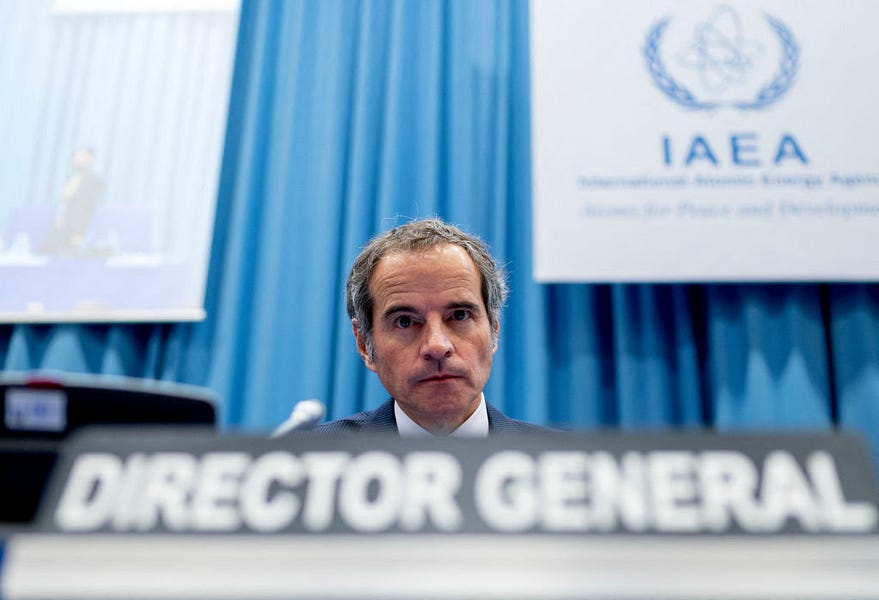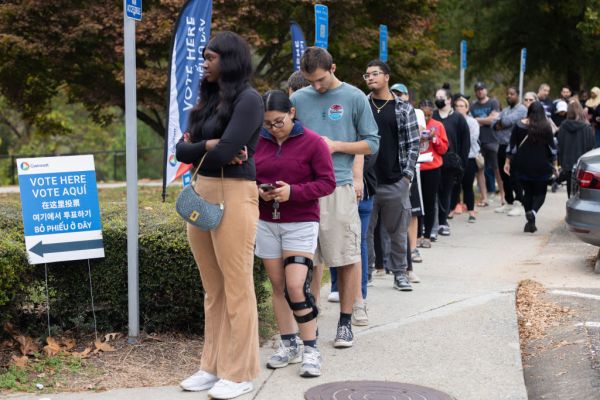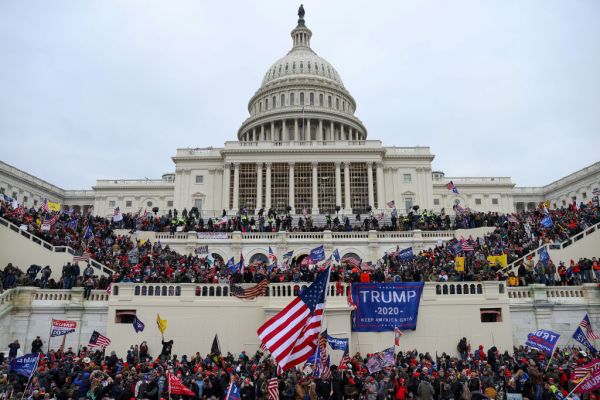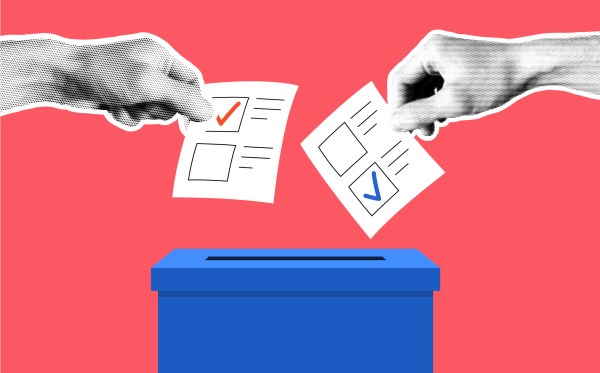The head of the International Atomic Energy Agency (IAEA) said on Saturday in Vienna that even if the United States reaches a new nuclear deal with Iran, his agency will not artificially close a nearly four-year-old investigation into Tehran’s undeclared atomic work. To date, the Islamic Republic has not cooperated with the probe and seeks its end in order to facilitate its return to a new version of the July 2015 nuclear deal, formally known as the Joint Comprehensive Plan of Action (JCPOA).
Rafael Grossi, the IAEA’s director general, and Mohammed Eslami, a vice president of Iran and the head of its Atomic Energy Organization, issued a joint statement following Grossi’s visit to Tehran that lays out a path forward for the investigation. According to this plan, Iran must provide written explanations in response to the IAEA’s outstanding questions by March 20. The agency then has two weeks to evaluate the information and send any questions back to Iran, which then has one week to respond. The agreement stipulates that Grossi “will aim to report his conclusion by the June 2022 Board of Governors” meeting.
The Grossi-Eslami agreement has positive, negative, and very negative implications for U.S. efforts to prevent Iran’s development of a nuclear weapon.
The positive. The new arrangement probably constitutes an improvement over the IAEA’s shamefully premature decision in 2015 to close an investigation into whether Tehran had a clandestine nuclear weapons program. This time around, Grossi said the IAEA would not accept an Iranian refusal to cooperate with a renewed investigation of Iran’s nuclear program that is now in its fourth year.
The JCPOA instructed the IAEA to issue a final report regarding what it had been able to determine about Tehran’s nuclear weapons activities up through 2015. To pave the way for implementation of the JCPOA, the parties to the accord—the United States, Britain, France, Germany, Russia, China and the foreign policy chief of the European Union—pressured the IAEA to finish within six months an investigation of Iran’s nuclear weapons activities that began in 2002.
However, in the months that followed, Iran proceeded to articulate outright lies and provide incomplete information to the agency. Nevertheless, the IAEA’s 35-member Board of Governors voted to remove the investigation from its agenda.
A renewed IAEA probe began in 2018 when Israel seized a tranche of Iran’s sensitive nuclear weapons files from a Tehran warehouse. This nuclear archive confirmed that the clerical regime had a robust nuclear weapons program up until 2003, with numerous sites and capabilities—both planned and constructed. The document showed that Tehran planned to produce an initial five nuclear weapons. The archive also revealed that as international attention toward Iran’s atomic activities grew, the regime planned to hide and continue some of its most sensitive nuclear weaponization work.
The IAEA evaluated this new information, as well as additional tips from a member state, and asked Iran about its potentially illicit use of nuclear material at four separate sites. At one of them, Iran moved the contents and tried to sanitize it before allowing IAEA access. Tehran then stonewalled IAEA requests for access to two of the other sites, attempting to sanitize one of them, and relented only when the IAEA board in June 2020 voted to censure Tehran. During its visits to these three sites, the IAEA detected the presence of man-made uranium particles.
The IAEA could not visit the fourth site because Iran had demolished it in 2003 and 2004, but the agency still has questions about what occurred there. Known as Lavisan-Shian, the site was the former headquarters of Iran’s nuclear weapons program.
Iran’s failure to declare nuclear material and relevant locations is a major breach of its legal obligations under the Nuclear Non-Proliferation Treaty (NPT). At his Saturday press conference, Grossi stated unequivocally that he will not end his investigation prematurely over political considerations or international efforts to revive the JCPOA. “I will not go for that,” he said.
Grossi’s refusal creates a possible headache for the Biden administration, which seeks a smooth return to a watered-down version of the JCPOA. However, Grossi is saying publicly that he is not going to capitulate to international pressure, as the IAEA did in 2015. This marks a positive development.
The negative. Notwithstanding Grossi’s promise, world powers could simply ignore the IAEA’s forthcoming June report and decline to censure Iran for non-cooperation. Grossi could also determine that Tehran failed to cooperate, but then break his pledge by declining to continue questioning Iran. Unless Grossi sticks to his commitment and insists on the full support of the parties to the JCPOA, the end result would not be different from the original deal’s investigation. Iran would escape a full accounting of its past and possibly ongoing nuclear weapons work, and still receive sanctions relief from an atomic pact.
Biden and the E3 (Germany, France, and the United Kingdom) deserve blame for this situation. Tehran has not engaged in meaningful cooperation with the agency on the recent probe. Yet instead of pressuring the Islamic Republic, Biden and the E3 provided tacit cover for Iran’s destructive behavior: At every quarterly IAEA Board of Governors meeting in 2021, the United States and E3 failed to censure Tehran’s non-cooperation, apparently fearful that a tougher line would jeopardize nuclear talks between the parties and Tehran.
Grossi also shares fault. Before nearly every board meeting, he would either travel to Tehran or meet with Iranian officials elsewhere, and would emerge with an understanding that allowed the Islamic Republic to avoid the board’s condemnation, only to see the understanding crumble when the threat of censure evaporated.
The very negative. Grossi stated on Saturday that he is dropping the IAEA’s inquiry into Lavisan-Shian. The agency learned from the nuclear archive that Iran allegedly carried out work there on a uranium metal disc, which is used in developing a trigger for atomic weapons. In Grossi’s latest report on Iran’s compliance with the NPT, he acknowledged that Iran’s “activities and the nuclear material used” at the location “were not declared by Iran to the Agency as required under the Safeguards Agreement.” Yet the agency no longer considers the issue outstanding “at this stage.”
Washington has previously rejected any effort to absolve Tehran of its NPT obligations. In April 2021, the State Department rightly noted that “any intentional failure by Iran to declare nuclear material would constitute a clear violation of Iran’s NPT-mandated [Comprehensive Safeguards Agreement], and would constitute a violation of Article III of the NPT itself.”
Yet at his Saturday press conference, Grossi dismissed prospects that the IAEA could learn what happened at Lavisan-Shian, saying, “there is no possibility also for Iran to disprove that it is or is not there.” Yet Iran could still answer what it did with the material and explain its activities. By closing the IAEA’s probe into Lavisan-Shian, Grossi is settling for not uncovering the truth about Iran’s activities at the site. In so doing, he is suggesting that the agency will not fully probe the regime’s past and possibly ongoing nuclear weapons program. This bodes poorly for the IAEA’s ability to reach a determination that Iran’s nuclear program is fully peaceful.
Such a determination would require the IAEA, among other steps, to visit all sites described in the nuclear archive; to access nuclear weapons-related equipment as seen in archive photographs and relocated elsewhere; to interview former or current nuclear weapons program personnel; and to access all relevant documentation. Iran would also need to account for any weaponization work to date and allow the IAEA to verify a new safeguards declaration about its past production of nuclear material.
In the coming months, if a revived nuclear deal is concluded, the parties to the JCPOA will begin lifting sanctions on Tehran, and the clerical regime will have no reason to cooperate with the IAEA or fully account for its nuclear weapons work at the three remaining sites. Iran would also lack any incentive to be transparent about its atomic past. Moreover, even if Grossi reports to the board that Iran has not cooperated with the safeguards probe, the parties to the JCPOA are unlikely to censure Tehran in order to ensure the nuclear deal’s continued implementation.
The United States, the E3, and Grossi may get a return to a nuclear deal with Iran, but they will have sacrificed the IAEA’s ability to fulfill its core mission: investigating and preventing nuclear weapons development. Tehran will have set a dangerous precedent that America’s adversaries and allies alike could use to conduct nuclear activities outside of the NPT safeguards regime.
Biden appears ready to follow Barack Obama’s lead and conclude a weak nuclear accord—and one whose provisions are already expiring—that stops the IAEA from investigating Iran, despite its obvious nonproliferation breaches. In the process, both presidents will have prevented the world from knowing how far Tehran’s nuclear weapons program proceeded and if it continues today.
Anthony Ruggiero is a senior fellow at the Foundation for Defense of Democracies (FDD), where Andrea Stricker is a research fellow. Anthony previously served in the U.S. government for more than 19 years, most recently as senior director for counterproliferation and biodefense on the U.S. National Security Council (2019-2021). Follow Anthony and Andrea on Twitter @NatSecAnthony and @StrickerNonpro. FDD is a Washington, D.C.-based, nonpartisan research institute focusing on national security and foreign policy.





Please note that we at The Dispatch hold ourselves, our work, and our commenters to a higher standard than other places on the internet. We welcome comments that foster genuine debate or discussion—including comments critical of us or our work—but responses that include ad hominem attacks on fellow Dispatch members or are intended to stoke fear and anger may be moderated.
You are currently using a limited time guest pass and do not have access to commenting. Consider subscribing to join the conversation.
With your membership, you only have the ability to comment on The Morning Dispatch articles. Consider upgrading to join the conversation everywhere.